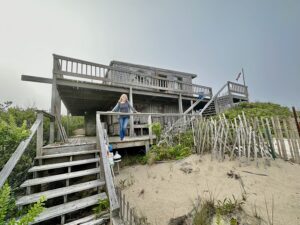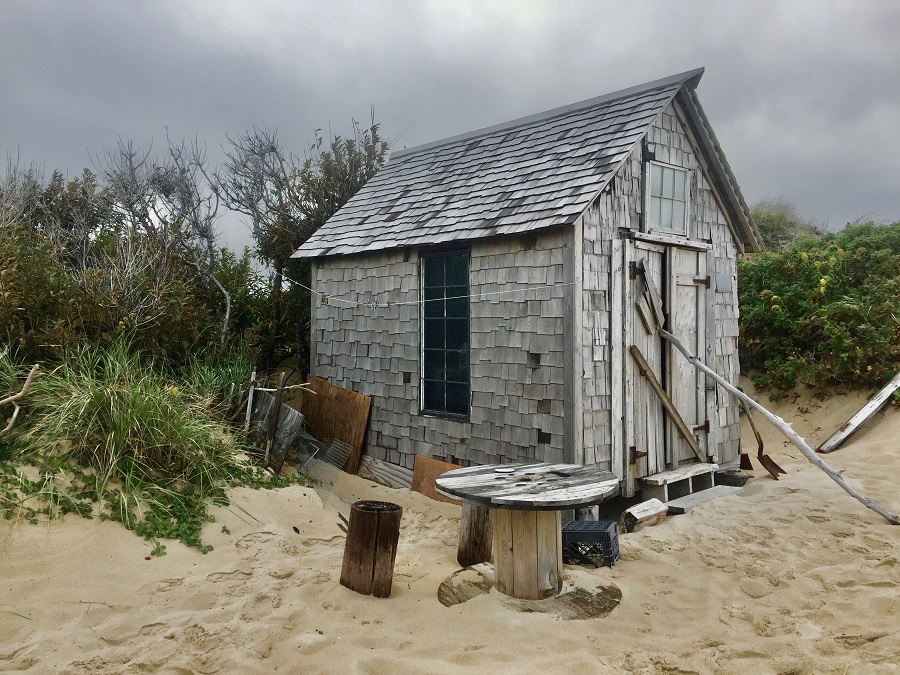PROVINCETOWN — Janet Armstrong is not sure exactly when she has to leave the dune shack where she took her first steps as a toddler in 1952, 71 years ago. It could be 90 days from the date of her notice-to-quit letter from the National Park Service: June 2. But the digital signature on the document was dated June 9, it was postmarked June 12, and she received it on June 16.

Whichever date turns out to be correct, the shack is due to be boarded up by the Park Service sometime in the first two weeks of September.
Cape Cod National Seashore Supt. Brian Carlstrom has told the select boards of Provincetown and Truro that there will eventually be a public leasing contest for the Armstrong shack — and for Frenchie’s shack, which Sal Del Deo, who will be 95 on Aug. 12, has cared for since 1953, and which was boarded up on June 29.
Those two shacks were not included in the public leasing contest for eight other dune shacks that was announced on May 1.
As things currently stand, Armstrong is supposed to vacate her family’s shack in September, taking all her property with her — then bid on the boarded-up shack sometime in the future — and if she is lucky, move everything back into it a year or two from now.
“This is not what’s in the plan we made,” said Armstrong, speaking of the Dune Shacks Historic District Preservation and Use Plan, which was finalized in 2012 and originated with a Dune Shack Subcommittee report that took two years, a mediator, and more than a dozen public meetings to create. Armstrong served on that subcommittee, and she said she cannot understand why its work has been discarded.
“The plan said that no shack will be vacated and closed, ever,” Armstrong said.
Indeed, on page 25, the Use Plan says that until a “transition has been implemented (notification of transition, designation of shack in terms of general use, leasing or special agreement processes, award of lease or agreement), the occupant would remain and be provided a special use permit, issued annually.”
The special use permit would end on the date a new leaseholder is set to take over, the plan says.

Animals can crawl in through holes invisible from the outside and wreak enormous damage on a boarded-up shack, Armstrong said. Weasels, woodpeckers, birds, and mice are major offenders, but even simple roof leaks can create dreadful messes.
The National Seashore will not be able to maintain these shacks on its own, she warned, and simply boarding them up will not protect the historic structures.
The Independent asked National Park Service officials including Director Charles Sams and Deputy Director Lena McDowall why the agency has departed so significantly from its own Preservation and Use Plan, which has the status of a “formal decision document” according to the agency’s 2015 National Environmental Protection Act (NEPA) Handbook.
The response — which came from Supt. Carlstrom — simply said, falsely, that the agency was following the 2012 plan.
In addition to boarding up dune shacks, the agency also did not use the additional lease selection criteria that were exhaustively negotiated with the Dune Shack Subcommittee, according to Armstrong, and specifically established in the 2012 plan.
Page 71 of the agency’s NEPA Handbook describes exactly how changes to such a plan can be made, and the Independent asked Park Service officials to describe any efforts it has taken to follow those procedures and document its changes to the 2012 plan. They did not answer.
Stonewalling
When Supt. Carlstrom canceled his July 24 meeting with the Provincetown Select Board — on the day of the meeting — board members said the Park Service was “stonewalling” and “harming our relationship with them.”
The agency is not stonewalling only Provincetown and Truro, however.
U.S. senators Ed Markey and Elizabeth Warren and U.S. Rep. Bill Keating sent a joint letter to NPS Director Sams on July 13 asking for a “thorough RFP review process that respects the history of the dune shacks and properly centers the concerns of the community.
“Although the ability to fulfill the financial commitment of the lease must be considered,” they wrote, “evaluating lessees disproportionately on an applicants’ financial means would be a catastrophic affront to any public accessibility goals and the shacks’ legacy as a place where artists and others with limited means have convened, worked, and built a community.”
The current RFP allows applicants to offer any amount of annual rent above the assessed market-rate rent as a competitive factor toward winning a lease — which critics have said turns the current leasing contest into a bidding war that favors the rich.
The New York Times described that conflict this week with the teaser “Tradition vs. Capitalism on Cape Cod” on its front page.
As of Aug. 8, at the Independent’s deadline, the National Park Service had not sent a written reply to Markey, Warren, and Keating, a spokesperson for Markey’s office confirmed.
A Deadline Approaches
Sal Del Deo’s son, Romolo Del Deo, said he is working with local attorneys Bruce Bierhans and Anthony Mavronicolas, who are donating their time, to try to talk the Park Service into mediation.
“More and more people are understanding what a huge mistake this is,” the younger Del Deo said. “The question is whether the machinations of bureaucracy can be impacted in time.
“Honestly, I have been reading their procedures, trying to figure out what they have been up to, and to me it looks like they just decided to cowboy this,” Del Deo said. “They didn’t follow their procedures. They didn’t follow their agreements. They just went off and did this thing, and they seemed to believe that no one would call them on it.”

Paul Tasha also served on the Dune Shack Subcommittee and is applying with his niece, Andrea Tasha, for a 10-year lease on the dune shack that poet Harry Kemp gave to his family in 1960. Like the other families whose dune shacks are in the May 1 RFP, the Tashas are supposed to remove all personal property and quit their shack on Sept. 2 — even though the Park Service may not have decided who won the lease for their shack by that time.
“Those meetings were long, and I never missed a meeting, and we came up with these qualifying criteria and everyone was OK with them,” Tasha said. “Slowly but surely, we hammered them out. And there was no talk about bidding as much as you wanted to, offering 20 grand or 50 grand or whatever in order to influence the bid.

“We came to an agreement, everyone was on the same page, and now you lied again,” Tasha said, speaking of the Park Service. “You can’t say you’re gonna do certain things and then not do it. It’s dishonorable.”
Editor’s note: An earlier version of this article, published in print on Aug. 10, incorrectly reported the name of one of the lawyers working with Romolo Del Deo. It is Anthony Mavronicolas, not “Anthony Nichols.”
